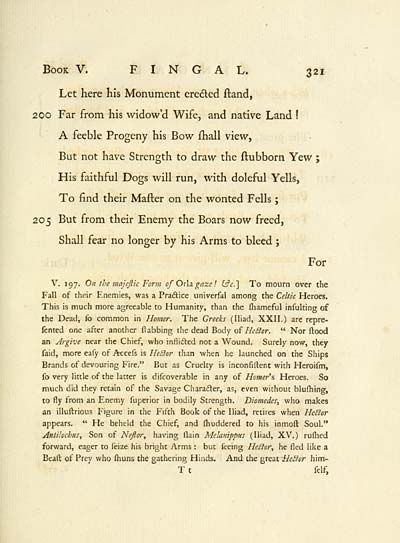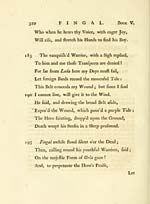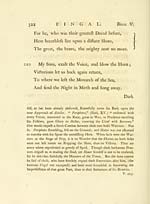Ossian Collection > Fingal of Ossian
(419)
Download files
Complete book:
Individual page:
Thumbnail gallery: Grid view | List view

Book V. F I N G A L. 321
Let here his Monument ereded ftand,
200 Far from his widow'd Wife, and native Land !
A feeble Progeny his Bow fhall view,
But not have Strength to draw the ftubborn Yew ;
His faithful Dogs will run, with doleful Yells,
To find their Mafter on the wonted Fells ;
205 But from their Enemy the Boars now freed.
Shall fear no longer by his Arms to bleed ;
For
V, 197. On the majeftic Form of Orla gaze ! y^.] To mourn over the
Fall of their Enemies, was a Pradice univerfal among the Celtic Heroes.
This is much more agreeable to Humanity, than the fliameful infulting of
the Dead, fo common in Homer. The Greeks (Iliad, XXII.) are repre-
fented one after another fiabbing the dead Body of Heiior. " Nor flood
an Jrgive near the Chief, who inflidled not a Wound. Surely now, they
faid, more eafy of Accefs is HeSior than when he launched on the Ships
Brands of devouring Fire." But as Cruelty is inconfiftent with Heroifm,
fo very little of the latter is difcoverable in any oi Homer' % Heroes. So
much did they retain of the Savage Character, as, even without blufhing,
to fly from an Enemy fuperior in bodily Strength. Diomedes, who makes
an illuftrious Figure in the Fifth Book of the Iliad, retires when He3or
appears. " He beheld the Chief, and fhuddered to his inmoft Soul."
Antilochus, Son of Nejior, having Qain Melanippus (Iliad, XV.) rullied
forward, eager to feize his bright Arms : but feeing Heiior^ he fled like a
Beaft of Prey who (huns the gathering Hinds. And the great HeSfcr him-
T t felf.
Let here his Monument ereded ftand,
200 Far from his widow'd Wife, and native Land !
A feeble Progeny his Bow fhall view,
But not have Strength to draw the ftubborn Yew ;
His faithful Dogs will run, with doleful Yells,
To find their Mafter on the wonted Fells ;
205 But from their Enemy the Boars now freed.
Shall fear no longer by his Arms to bleed ;
For
V, 197. On the majeftic Form of Orla gaze ! y^.] To mourn over the
Fall of their Enemies, was a Pradice univerfal among the Celtic Heroes.
This is much more agreeable to Humanity, than the fliameful infulting of
the Dead, fo common in Homer. The Greeks (Iliad, XXII.) are repre-
fented one after another fiabbing the dead Body of Heiior. " Nor flood
an Jrgive near the Chief, who inflidled not a Wound. Surely now, they
faid, more eafy of Accefs is HeSior than when he launched on the Ships
Brands of devouring Fire." But as Cruelty is inconfiftent with Heroifm,
fo very little of the latter is difcoverable in any oi Homer' % Heroes. So
much did they retain of the Savage Character, as, even without blufhing,
to fly from an Enemy fuperior in bodily Strength. Diomedes, who makes
an illuftrious Figure in the Fifth Book of the Iliad, retires when He3or
appears. " He beheld the Chief, and fhuddered to his inmoft Soul."
Antilochus, Son of Nejior, having Qain Melanippus (Iliad, XV.) rullied
forward, eager to feize his bright Arms : but feeing Heiior^ he fled like a
Beaft of Prey who (huns the gathering Hinds. And the great HeSfcr him-
T t felf.
Set display mode to: Large image | Transcription
Images and transcriptions on this page, including medium image downloads, may be used under the Creative Commons Attribution 4.0 International Licence unless otherwise stated. ![]()
| Early Gaelic Book Collections > Ossian Collection > Fingal of Ossian > (419) |
|---|
| Permanent URL | https://digital.nls.uk/77606946 |
|---|
| Description | Selected books from the Ossian Collection of 327 volumes, originally assembled by J. Norman Methven of Perth. Different editions and translations of James MacPherson's epic poem 'Ossian', some with a map of the 'Kingdom of Connor'. Also secondary material relating to Ossianic poetry and the Ossian controversy. |
|---|
| Description | Selected items from five 'Special and Named Printed Collections'. Includes books in Gaelic and other Celtic languages, works about the Gaels, their languages, literature, culture and history. |
|---|

